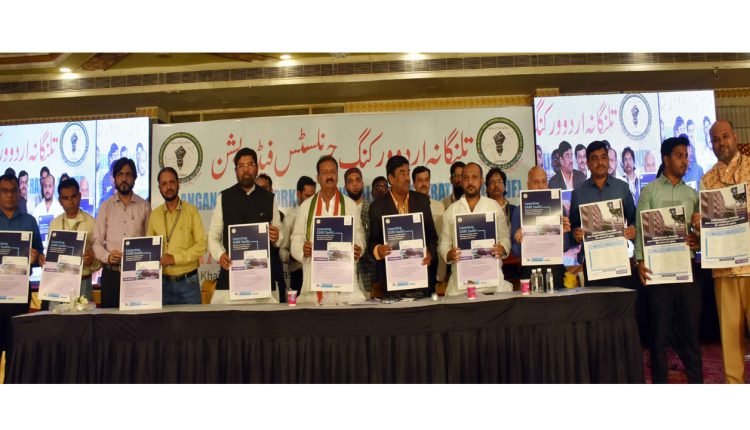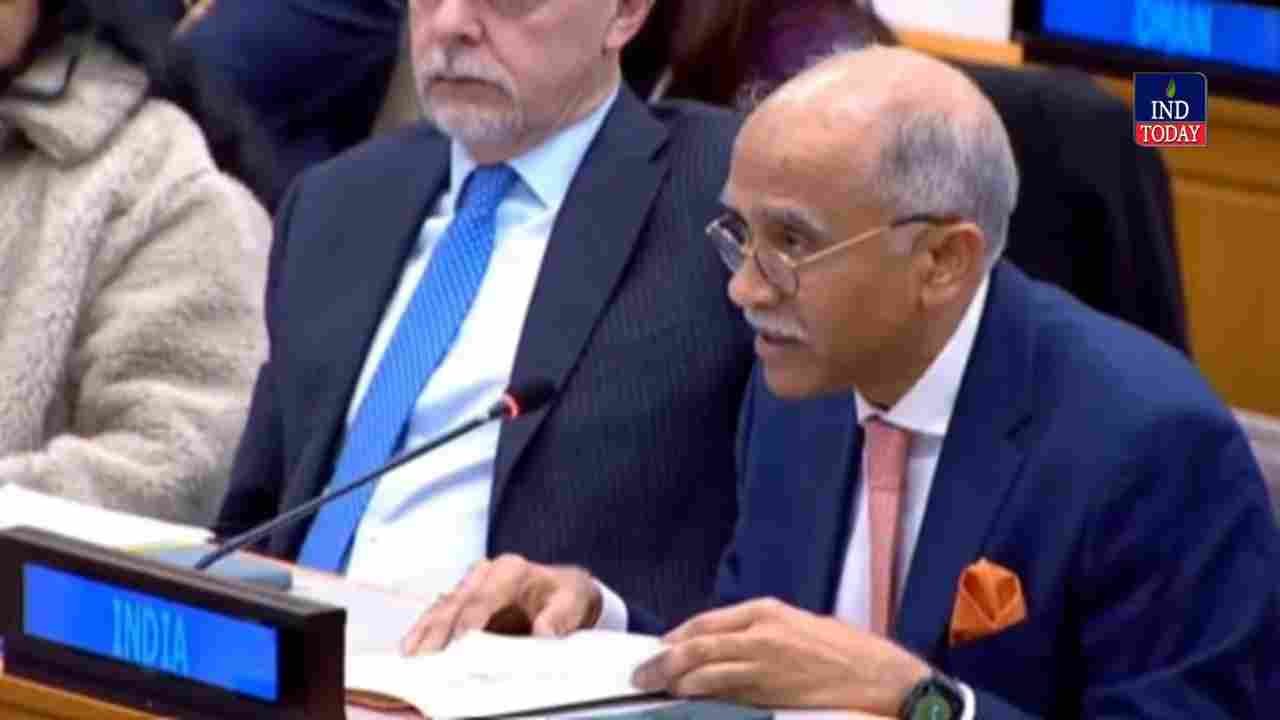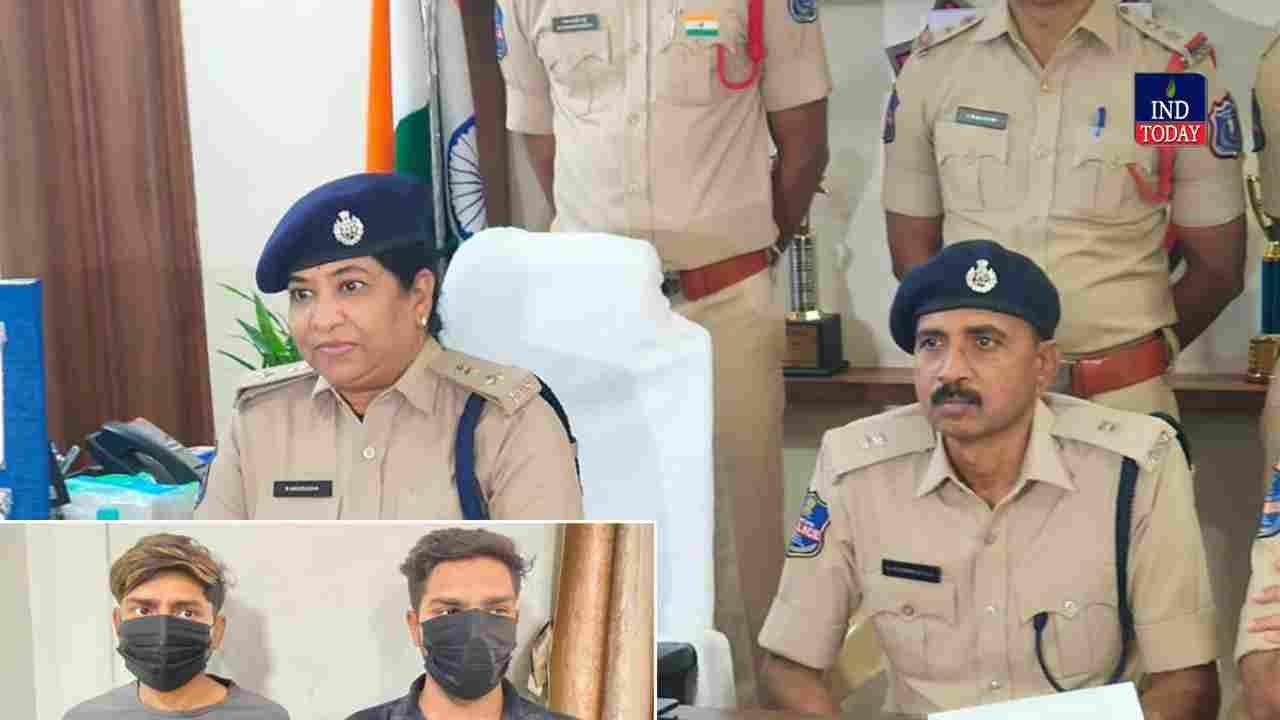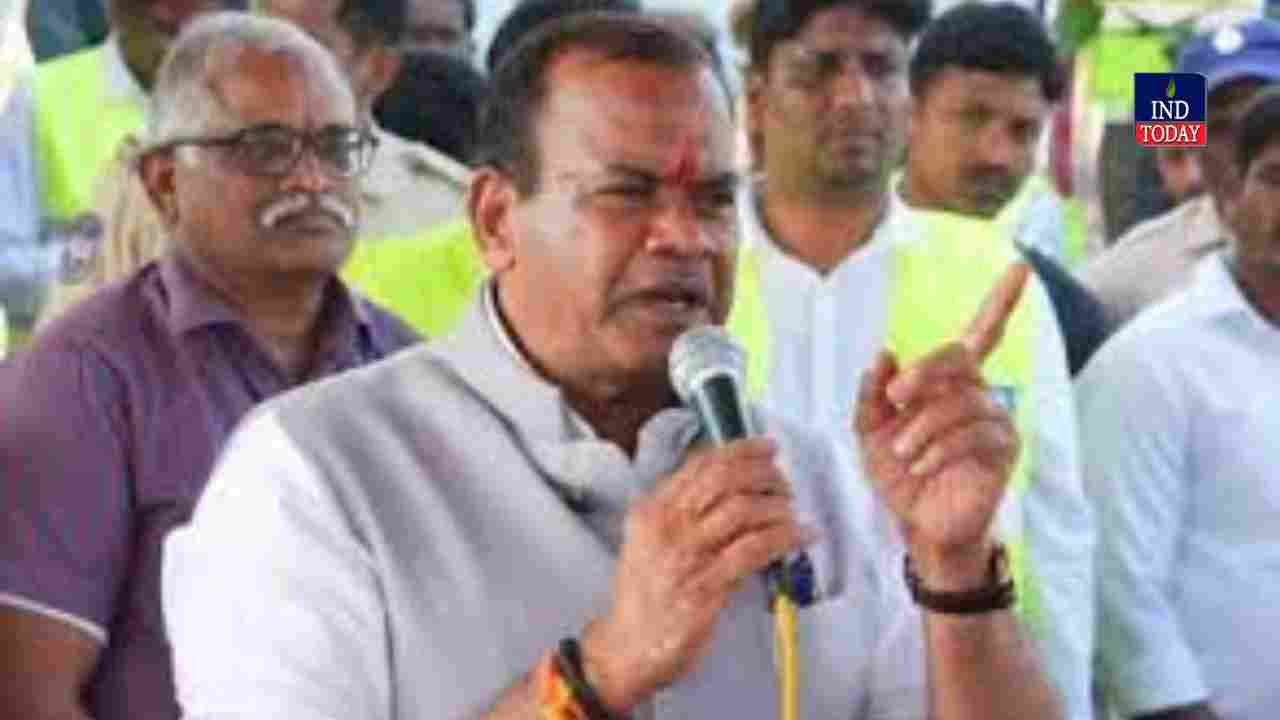1st National Conference Of TUWJF Sparks Dialogues On The Future Of Urdu Journalism
- LEADERS ACROSS PARTY LINE, ACADEMICIANS AND RENOWNED JOURNALISTS CONVERGE TO DISCUSS URDU JOURNALISM
Hyderabad, May 29 (Maxim News): The 1st National conference of the Telangana Urdu Working Journalists Federation (TUWJF) took place on Sunday at Hyderabad in which more than 800 Urdu Journalists from Telangana, Andhra Pradesh, Karnataka, Maharashtra, Gujarat, etc, leaders across the party line and academicians engage in thought-provoking discussions on the challenges and future of Urdu Journalism in India.
Presiding over the conference M.A. Majid, the President of TUWJF and a Member of the Press Council of India, Majid’s leadership set the tone for the day-long event, which proved to be a platform for insightful dialogues and the exchange of ideas.
The conference witnessed the valuable contributions of prominent figures from various domains. Among the notable speakers was DGP Anjani Kumar who shared his perspectives on the role of conscious journalism and upholding democracy. The insightful remarks made by Anjani Kumar resonated with the audience, highlighting the importance of responsible reporting and the need for journalists to play their part in preserving democratic values.
Congress senior leader and former minister Mohammed Ali Shabbir addressed the gathering, passionately advocating for government support in reviving Urdu journalism. Shabbir highlighted the decline in Urdu readership and emphasized the crucial role that government assistance can play in rejuvenating the Urdu language. His remarks shed light on the significance of promoting Urdu at all levels and ensuring its preservation for future generations.
The conference further benefited from the expertise of academicians who shared their insights on the subject. Prof. Padmaja Shaw, the former Head of the Department of Journalism at Osmania University, and Prof. Mohd Fariyad, the Head of the Department of Mass Communication and Journalism at MANUU, provided valuable perspectives on the challenges and opportunities faced by Urdu journalism. Their scholarly contributions enriched the discourse and provided a holistic view of the current landscape.
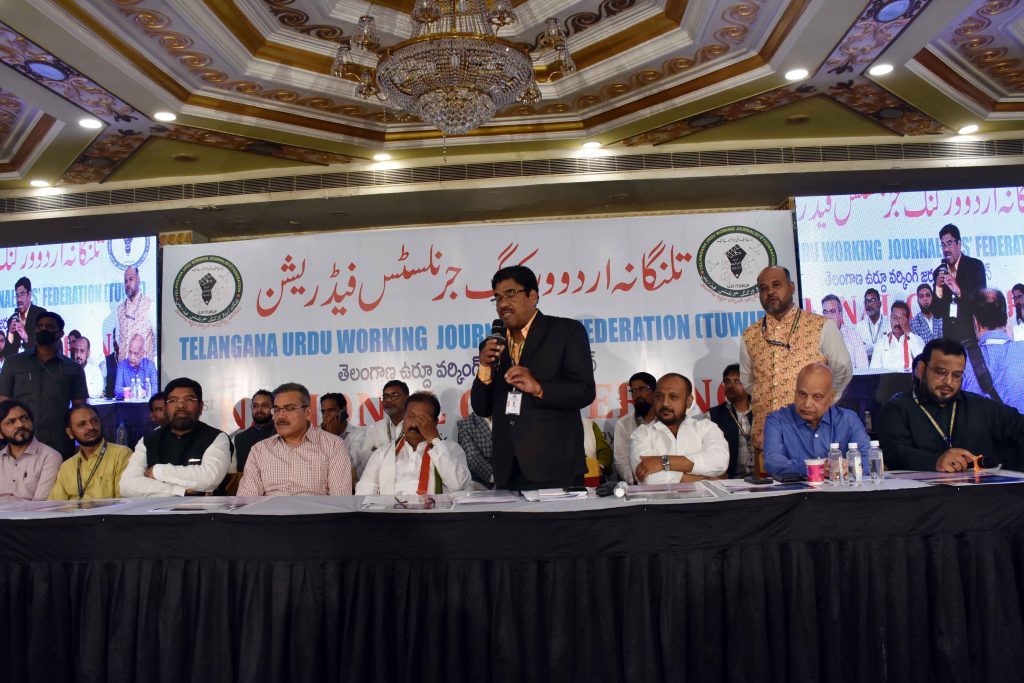
The esteemed gathering also included Prof. S.A. Shukoor, the former Director of the Urdu Academy, Sriram Karri, the Resident Editor of Deccan Chronicle, Sameer Waliullah, the President of Hyderabad DCC, Ali Bin Ibrahim Masqati, the Vice President of Telangana TDP, and BRS leader Moid Khan, among others. Each speaker brought their unique perspectives and experiences to the table, contributing to a comprehensive exploration of the issues faced by Urdu journalists and the path forward.
The day-long conference featured multiple sessions, allowing for in-depth discussions on various aspects of Urdu journalism, including its significance, challenges, and potential solutions. These sessions provided a platform for fruitful exchanges and meaningful conversations among the attendees, fostering a sense of unity and purpose within the Urdu journalist community.
The National Conference of TUWJF not only showcased the commitment and dedication of Urdu journalists but also highlighted the need for collective efforts to address the challenges faced by the Urdu media industry. The event served as a reminder of the rich cultural heritage associated with the Urdu language and the responsibility of journalists to preserve and promote it through their work.
Overall, the conference was a resounding success, marked by the presence of influential leaders, thought-provoking discussions, and a shared commitment to the betterment of Urdu journalism. The collective voice of the speakers resonated with the audience, leaving a lasting impact and setting the stage for further collaborations and initiatives aimed at uplifting the Urdu journalism landscape in India.
NEEDS GOVT SUPPORT FOR REVIVAL OF URDU JOURNALISM: SHABBIR ALI
Congress senior leader and former minister Mohammed Ali Shabbir has voiced a strong plea for government support in reviving urdu Journalism in India.
Shabbir Ali shared his concerns about the declining number of Urdu readers in India, particularly Telangana. Despite the rich 200-year history of Urdu journalism in India – with the first Urdu newspaper, Jam-e-Jahan Numa, published on March 27, 1822, from Calcutta – the former minister highlighted the significant decrease in Urdu newspapers’ readership. According to Shabbir, this can primarily be attributed to the lack of sufficient government support.
He pointed out that the prosperity of Urdu journalism, like any language journalism, is directly proportional to its readers. As such, increasing the Urdu readership at the grassroots level should be a priority. He highlighted that although Urdu was declared the second official language in Telangana in 2017, its implementation has been lackluster, particularly in education. He noted that over 4,000 primary schools, including several Urdu medium institutions, have been shut down in Telangana since 2014.
The Urdu Academy’s role, he argued, needs to be more significant than merely printing textbooks. Promotion of the Urdu language should be prioritized, and financial resources should be allocated for this purpose. According to Shabbir Ali, Urdu cannot be preserved merely through Mushairas or awards, it needs to reach every household and be taught to every child.
Highlighting the demographics, Shabbir Ali stated that the Urdu-speaking population in Telangana, with a total population of nearly 3.5 crore, has increased to 12.69%. However, the actual number of those who can read and write Urdu is uncertain but seemingly low, inferred from the daily sales of all Urdu newspapers combined, which does not exceed 1 lakh copies. This implies only 0.225% of the Urdu-speaking population is buying the newspaper.
Shabbir Ali argued that this landscape could be transformed if the state government actively promoted the Urdu language, revived primary schools, and made a concerted effort to teach the Urdu-speaking population to read and write in Urdu. He highlighted his own efforts when serving as a minister in the YSR Cabinet, where he promoted Urdu at all levels, initiated 34 Urdu computer centers, distributed computers among small newspapers and agencies, and awarded Urdu journalists, writers, and poets, alongside providing them with health cards.
Malakpet MLA Ahmed Balala expressed concern over the inability of the Urdu Academy to help the Urdu journalists. He said that the State Government should take serious steps to ensure the promotion of the Urdu language. He said that the Urdu readership and viewership could not be improved until Urdu viewership is increased. He also exhorted the Urdu-speaking population to encourage their children to learn to read and write the Urdu language.
DGP CALLS FOR CONSCIOUS JOURNALISM AND UPHOLDING DEMOCRACY
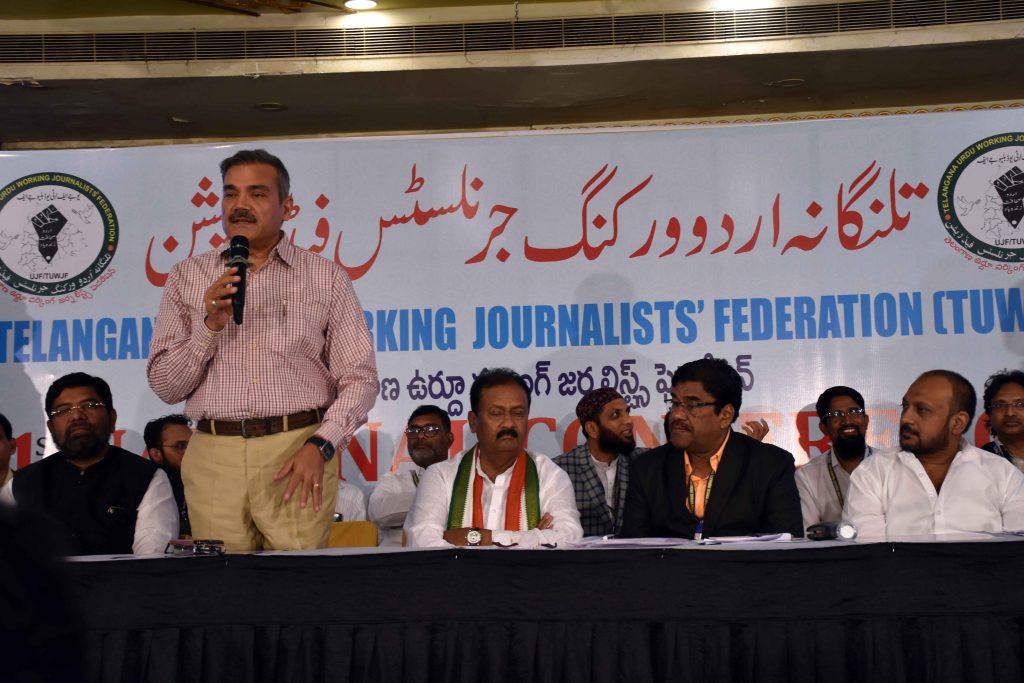
In a stirring speech at the 1st National Conference of Telangana Urdu Working Journalists Federation (TUWJF), Telangana’s Director-General of Police Anjani Kumar addressed the challenges and responsibilities of modern journalism.
Anjani Kumar opened his address with a reflection on the state of contemporary news reporting, noting its swift pace and global reach. However, he expressed concern over the influence of money on news organisations, urging the journalistic community to rise above financial sway and maintain objectivity. He stressed the importance of conscious writing and questioned whether readers have the time or inclination to read the same news in multiple papers, indicating the necessity for unique and succinct reporting.
The DGP reminded the audience of the strength and privilege of living in a country that has upheld democracy for over 70 years – a feat not matched by nations like Japan or Korea. To protect and further this democratic legacy, he encouraged the promotion of equal opportunities and responsible news presentation that is respectful and doesn’t hurt any sentiments. He also called for the media to ensure that political rivalry or enmity doesn’t exceed acceptable limits.
Anjani Kumar discussed the influence of journalism on the new generation. The DGP suggested that journalists have a role to play in directing youthful thought in a positive direction, noting that a small spark can turn into a significant fire, but conversely, a major incident, if handled correctly, can be contained.
The DGP focused on the competitiveness of the modern world, where not just individuals, but cities and countries compete against each other. He highlighted that Telangana, which had nine out of ten districts listed as backward at its formation in 2014, now boasts a higher per capita income than Gujarat.
Anjani Kumar emphasized the need for patriotism and sacrifice, placing the country’s and the state’s needs above personal or family’s needs. He urged every journalist to have domain knowledge and encouraged senior professionals to support the younger generation.
Addressing the relationship between the police and the press, Kumar acknowledged the role of the police department’s Public Relations Officers in sharing information. He appealed to the media for understanding when certain details can’t be revealed in the early stages of investigations, as premature disclosure could alert criminals.
SRIRAM KARRI URGES URDU JOURNALISTS TO CHAMPION FEARLESS ACCOUNTABILITY
Senior Journalist and Resident Editor of Deccan Chronicle, Sriram Karri, delivered an inspiring address and emphasized the essential role of journalists in holding authorities accountable and urged Urdu journalists to carry out their duties fearlessly and impartially.
Addressing the gathering, Sriram Karri highlighted the importance of journalists as the watchdogs of society. He emphasized that it is the duty of journalists to question those in power and authority without any fear or favor. Karri underscored the significance of unbiased and fearless reporting in ensuring transparency and accountability in governance.
He encouraged Urdu journalists to embrace their responsibility as the Fourth Estate and to use their platform to bring important issues to light, shed light on corruption and wrongdoing, and voice the concerns of the public. He emphasized that journalism is a noble profession that plays a pivotal role in safeguarding democracy and upholding the principles of justice and equality.
Furthermore, Sriram Karri stressed the need for journalists to uphold their integrity and independence in the face of external pressures. He reminded the audience that journalism should never be influenced by personal biases or external interests but should instead serve the greater good of society. By asking tough questions, conducting thorough investigations, and presenting unbiased news, journalists can fulfill their duty to inform and empower the public.
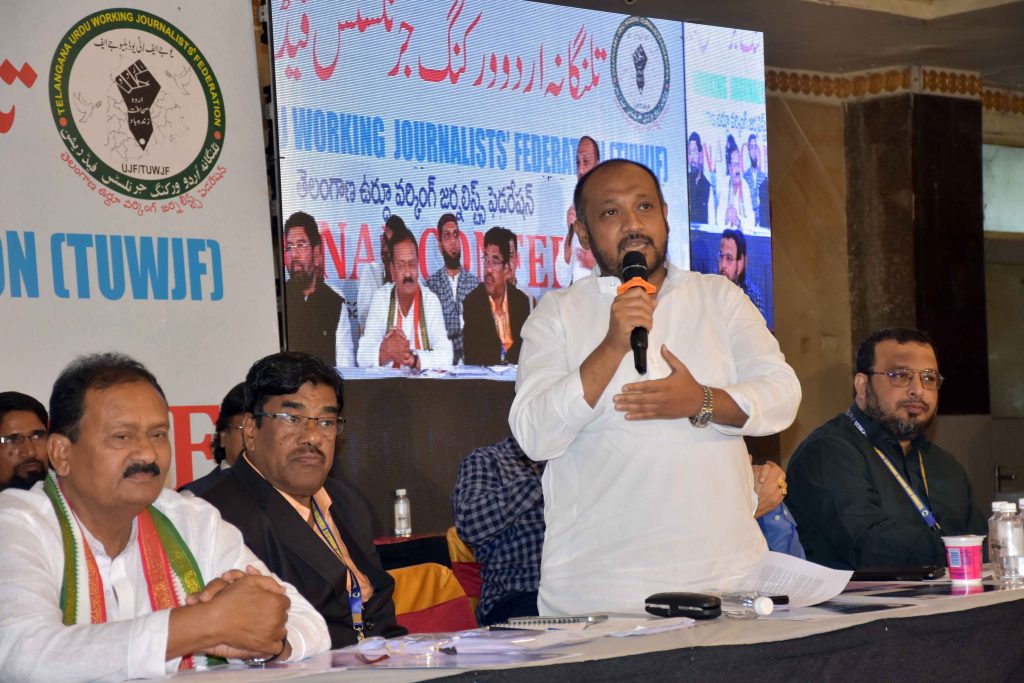
Hyderabad DCC President Sameer Waliullah, who runs the INN Channel. Waliullah described the national conference as historic and lauded the efforts of TUWJF President MA Majid and others in advocating for the rights of Urdu journalists. (Maxim News)
Next Story :
Santosh Rao Attends SIT Inquiry In Phone Tapping Case
![Santosh Rao Attends SIT Inquiry In Phone Tapping Case]()
Former Rajya Sabha MP Santosh Rao appears before the SIT for questioning in the phone tapping case at the Jubilee Hills ACP office.
Now you can get the latest stories from Indtoday on Telegram every day. Click the link to subscribe. Click to follow Indtoday’s Facebook page and Twitter and Instagram. For all the latest Hyderabad News updates

